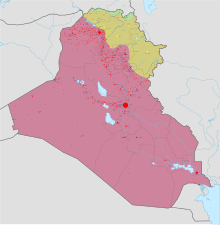This article needs additional citations for verification. (October 2022) |
The Iraqi conflict is a series of violent events that began with the 2003 American-led invasion of Iraq and deposition of Iraqi president Saddam Hussein, the most recent of which is the ISIS conflict, in which the Iraqi government declared victory in 2017.[4]
In the ensuing 2003-11 Iraq War, the Multi-National Force (MNF–I) led by the United States helped to establish a Shia-dominated federal government, which was soon opposed by an Iraqi insurgency.[5] Insurgent groups mostly fought the new government and MNF-I, but also each other, mostly along sectarian lines between Shias and Sunnis. In 2011, the MNF–I withdrew from Iraq, leading to renewed sectarian violence and enabling the emergence of the Islamic State (IS). The renewed war drew an American-led intervention in 2014.[6] Full-scale fighting in the country came to a close in 2017 as the Iraqi government and its allies largely defeated the IS. A low-level IS insurgency continues in the rural northern parts of the country.[1]
- ^ a b "Photos: Iraq UNESCO site opens to tourists after years of strife". Al Jazeera. Retrieved 2022-09-16.
- ^ "Human cost of post-9/11 wars: direct war deaths in major war zones, Afghanistan & Pakistan (Oct. 2001 – Aug. 2021); Iraq (March 2003 – Aug. 2021); Syria (Sept. 2014 – May 2021); Yemen (Oct. 2002-Aug. 2021) and other post-9/11 war zones". The Costs of War. Retrieved 2021-09-10.
- ^ "Millions displaced by U.S. post 9/11 wars" (PDF). The Costs of War.
- ^ Sayle, Timothy Andrews (2019). "US War in Iraq since 2003". Oxford Reference Dictionary. Oxford University Press. doi:10.1093/acrefore/9780199329175.013.723. ISBN 978-0-19-932917-5. Retrieved 2 January 2024.
- ^ "Iraq War". Encyclopædia Britannica. Archived from the original on 16 October 2012. Retrieved 27 October 2012.
- ^ Gordon, Michael; Trainor, Bernard (1 March 1995). The Generals' War: The Inside Story of the Conflict in the Gulf. New York: Little Brown & Co.
